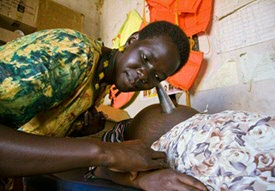Unintended births are related to gender inequalities in sub-Saharan Africa

Women in sub-Saharan Africa (SSA) have the highest rates of unintended births in the world, often with severe implications for the health and well-being of their families. It is therefore pivotal to understand how women’s chances of unintended birth are affected by gender dynamics at household and community level.
In a recent research paper, published in the Journal of Marriage and Family , Prof. Hilde Bras (Faculty of Arts, UG) and Prof. Jeroen Smits (Radboud University) examine how women's chances of having an unintended birth are related to gender inequalities in education, employment, intra-household decision-making, and gender norms at individual, household, and community levels in SSA.
Bras and Smits discovered that the odds of unintended birth are higher among higher-educated women, women with a small age difference with their husbands, and women living in communities with better (reproductive) health facilities and more higher-educated women. These women are more willing to acknowledge a birth as unintended. In communities where women are relatively more educated than their husbands and in households where husbands and wives are equal in terms of education, occupational status, and fertility preferences, odds of unintended birth are lower.
You can access the research paper via Wiley Open Library .
More information
Hilde Bras
is Professor of Economic and Social History, with special attention to Global Demography and Health and one of the new
Aletta Jacobs professors
at the University of Groningen. Her research interests include the history of reproductive health, maternal and child health, gender inequalities, and medical and health humanities.
Jeroen Smits is Professor of Economic and Human Development at the Department of Economics of Radboud University and head of the Global Data Lab. His research interests include (all forms of) inequality, social cohesion, (economic) development and database building.
| Last modified: | 04 November 2021 11.08 a.m. |
More news
-
12 March 2025
Breaking news: local journalism is alive
Local journalism is alive, still plays an important role in our lives and definitely has a future. In fact, local journalism can play a more crucial role than ever in creating our sense of community. But for that to happen, journalists will have to...
-
11 March 2025
Student challenge: Starting Stories
The Challenge Starting Stories dares you to think about the beginning of recent novels for ten days.
-
11 March 2025
New: Sketch Engine, tool for language research
Sketch Engine is a tool for language research, which can also be used for text analysis or text mining.
